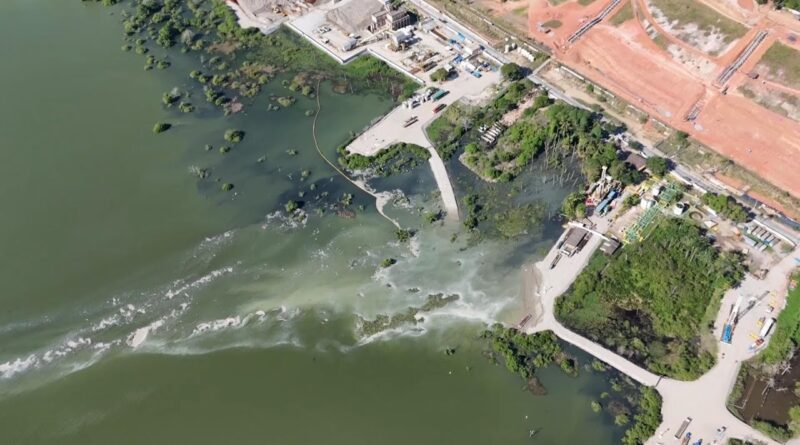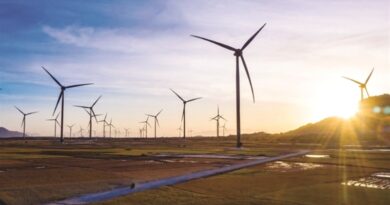Third mine disaster in a decade tests ESG boundaries in Brazil
Investors were swift to dump the debt of Braskem SA after the Brazilian petrochemicals maker’s salt mine partially collapsed in December—a situation that has forced tens of thousands to evacuate the city of Maceio since 2019.
The selloff lasted less than a month before the prices recovered.
It was a rebound reminiscent of what happened in the wake of Samarco’s tailings dam collapse in 2015 and the rupture of a Vale SA dam in Brumadinho that killed 270 people in 2019: Any punishment levied by the debt markets was short-lived.
Again and again, Brazil is showing just how quickly money managers are willing to shrug off disasters, raising questions about the effectiveness of environmental, social, and governance guidelines. It’s an example of the fading enthusiasm for what was supposed to be a new era of responsible investing worldwide.
ESG-focused funds saw net global outflows for the first time last year as investors were quick to move their money into traditional asset classes where better returns awaited.
In the case of Braskem, they looked beyond the environmental and governance concerns.
“Once you get past that and really start digging under into the quality and the caliber of the company, this is a whole different ball game,” said Jennifer Gorgoll, an Atlanta-based portfolio manager at Neuberger Berman Group LLC, which owns the bonds.
Braskem’s debt has rallied about 7% this year, even as the collapse of one of its old salt works threatens the entire neighborhoods of Maceio, a town of one million people in northeastern Brazil. At one point, a section of the town was sinking as much as 5 centimeters (2 inches) an hour, according to a statement by the Civil Defense.
The environmental disaster initially cost Braskem its investment-grade status and sent its bonds due in 2030 down as much as 12.5 cents on the dollar at one point. Yet, the notes have trimmed losses to trade around 80 cents amid expectations that the company’s balance sheet can absorb any undisclosed liabilities.
The Sao Paulo-based company, which has industrial conglomerate Novonor SA as its biggest shareholder, tapped global debt markets in September and has enough cash to meet upcoming debt maturities.
The concerns are now largely focused on other factors, such as a congressional probe that’s set to begin in February. Local authorities want Braskem to be hit with as much as 30 billion reais in potential liabilities. The company, which had been mining in Maceio for five decades, has already committed to paying 14 billion reais in compensation and relocation costs.
The lack of clarity around the total size of damages is keeping some investors away and likely limiting a further rally in the bond market.
“It’s very hard for an analyst to go to their portfolio manager and say there is sufficient certainty to step in at this time,” said Roger Horn, senior emerging-market strategist at Mariva Capital Markets in Miami. Even though most investors believe Braskem has a “sufficient war chest” of liquidity to deal with additional liabilities, the outlook remains murky, he said.
If history is a guide, bond buyers will eventually venture back.
Regulatory shortcomings
That’s what’s happened to Vale. Even after two major mining mishaps—one for its own dam and another for its Samarco joint venture—the bonds due in 2036 trade at around 108 cents on the dollar.
In fairness, Brazil doesn’t make it easy for investors to price in ESG risks due to shortcomings in its regulatory oversight of the sector.
The Brumadinho accident five years ago was supposed to be a turning point. The government banned so-called upstream dams, which are the cheapest and most dangerous way to contain tailings waste. The mining regulator ordered the dismantling of such structures, a work that’s still in progress since dam interventions are risky.
But most congressional bills aimed at improving controls after the disasters are still pending analysis, including one that sets specific environmental licensing rules for miners. On top of that, local regulators and authorities remain overburdened with budget and staffing shortfalls, according to Suely Araujo, a researcher and senior public-policy specialist at Observatorio do Clima, a network of environmental organizations.
Regulatory shortcomings
That’s what’s happened to Vale. Even after two major mining mishaps—one for its own dam and another for its Samarco joint venture—the bonds due in 2036 trade at around 108 cents on the dollar.
In fairness, Brazil doesn’t make it easy for investors to price in ESG risks due to shortcomings in its regulatory oversight of the sector.
The Brumadinho accident five years ago was supposed to be a turning point. The government banned so-called upstream dams, which are the cheapest and most dangerous way to contain tailings waste. The mining regulator ordered the dismantling of such structures, a work that’s still in progress since dam interventions are risky.
But most congressional bills aimed at improving controls after the disasters are still pending analysis, including one that sets specific environmental licensing rules for miners. On top of that, local regulators and authorities remain overburdened with budget and staffing shortfalls, according to Suely Araujo, a researcher and senior public-policy specialist at Observatorio do Clima, a network of environmental organizations.
Source : mining.com




